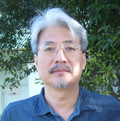Meet Dr. Jaeseung Cha, where East meets West
November 1, 2012
 A theological explorer of sorts, Dr. Jaeseung Cha has traveled as far as the volcanic islands of Vanuatu, off the coast of New Zealand, in search of primitive tribal accounts of divine self-sacrifice, Christ in Crucifixion, in the Asian world, that predate Western missionaries. “I found people who collected all kinds of stories about human sacrifice,” Dr. Cha explains. His examples are compelling: A tribe kills one of its members, bringing the body as a gift to make peace with another. A heartbreaking image, but does it say something about God? “The truth is, I have found no such story about God,” he admits. “There is none.”
A theological explorer of sorts, Dr. Jaeseung Cha has traveled as far as the volcanic islands of Vanuatu, off the coast of New Zealand, in search of primitive tribal accounts of divine self-sacrifice, Christ in Crucifixion, in the Asian world, that predate Western missionaries. “I found people who collected all kinds of stories about human sacrifice,” Dr. Cha explains. His examples are compelling: A tribe kills one of its members, bringing the body as a gift to make peace with another. A heartbreaking image, but does it say something about God? “The truth is, I have found no such story about God,” he admits. “There is none.”
Dr. Cha joins New Brunswick Theological Seminary this year as Associate Professor of Foundational and Constructive Theology. A systematic theologian steeped in Western and Eastern tradition, he uses his research to bridge the divide between traditional Western and Eastern contextual theology. His work focuses on the Crucifixion of Christ as the transcendent aspect of God. “The red thread through my work is diversity, harmony and a persistent highlighting of the uniqueness of Christ.”
The red thread is a Dutch concept for a guiding theme. Cha learned it at Western Theological Seminary in Holland, Michigan where he received both M.Div and Th.M degrees. “Knitters will weave a red thread in their yarn to help them measure,” he explains. Holland, Michigan was a wonderful place to study, he says, peaceful, quiet–if somewhat homogenous. “Just like Holland, Holland!” he exclaims. In the Netherlands, Cha completed his Ph.D. in Systematic Theology at the Free University in Amsterdam.
Born in South Korea, Dr. Cha and his wife find New Jersey exciting. Their son, 25, is a medical student at Dartmouth. “New Jersey is so diverse, with so many cultures!” he marvels. He hopes to help increase the diversity of the Seminary, too. In the Philippines, he served four years as Associate Professor at the Presbyterian Theological Seminary. His students were Bangladeshi, Vietnamese, Thai. One day, he dreams of raising funds to bring students from all over Asia and Africa to New Brunswick. “We can learn a great deal from cultural differences and contextual diversities,” Dr. Cha asserts. “While affirmi ng the uniqueness of Christ (Christus unicus)–that should be proclaimed in any cultural and philosophical setting, we may find fresh insights and paradigms by which to experience and participate in the totality of Christ (Christus totus).
He’s teaching two classes this fall: Public Theology and the Foundations of Theology. “We’ll cover the essential texts and a variety of liberation, contextual, public, and linguistic theologies,” Dr. Cha explains. The danger he sees is that each theology can become an oppressing power. There’s no reason why an Asian must embrace Asian contextual theology and an African-American a liberation theology. “I hope students will gain a sense of freedom, that there are many expressions of theology to explore, while understanding the profound values of classical theologies.” Dr. Cha is also an ordained minister in the Reformed Church in America.
